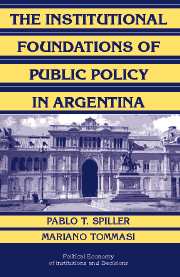Introduction
Published online by Cambridge University Press: 17 March 2011
Summary
Argentina's sovereign debt default in December 2001 attracted the attention of scholars and policy makers around the world. A country that had a per capita income comparable to Canada's at the turn of the nineteenth century had become an economic disaster 100 years later, with 50 percent of the population living in poverty. Its inability to produce consistent public policies is, we contend, the cause of its economic misfortunes as well as a puzzle that requires explanation.
Argentina's policies have tended to shift dramatically over time. Its aggregate economic policy stance has moved from highly interventionist to extremely promarket and back. After many years of very high inflation and many unsuccessful stabilization attempts, the government introduced a rigid stabilization mechanism known as convertibility in 1991. This mechanism allowed for a reduction of inflation to international standards and resulted in a decade of relative macroeconomic prosperity. But the convertibility regime fell chaotically in early 2002 in the aftermath of the default, leading to one of the worst economic crises in recent world history. Argentine microeconomic policies have also been volatile. The geographical distribution of welfare payments changes as frequently as does the minister in charge of social welfare. Public utility policy moves from promoting private investment in infrastructure to asking foreign investors to leave. And, unlike some of its regional neighbors like Brazil or Chile, Argentina also seems unable to steer a well-defined course in its relations with the rest of the world.
- Type
- Chapter
- Information
- The Institutional Foundations of Public Policy in ArgentinaA Transactions Cost Approach, pp. 1 - 10Publisher: Cambridge University PressPrint publication year: 2007



